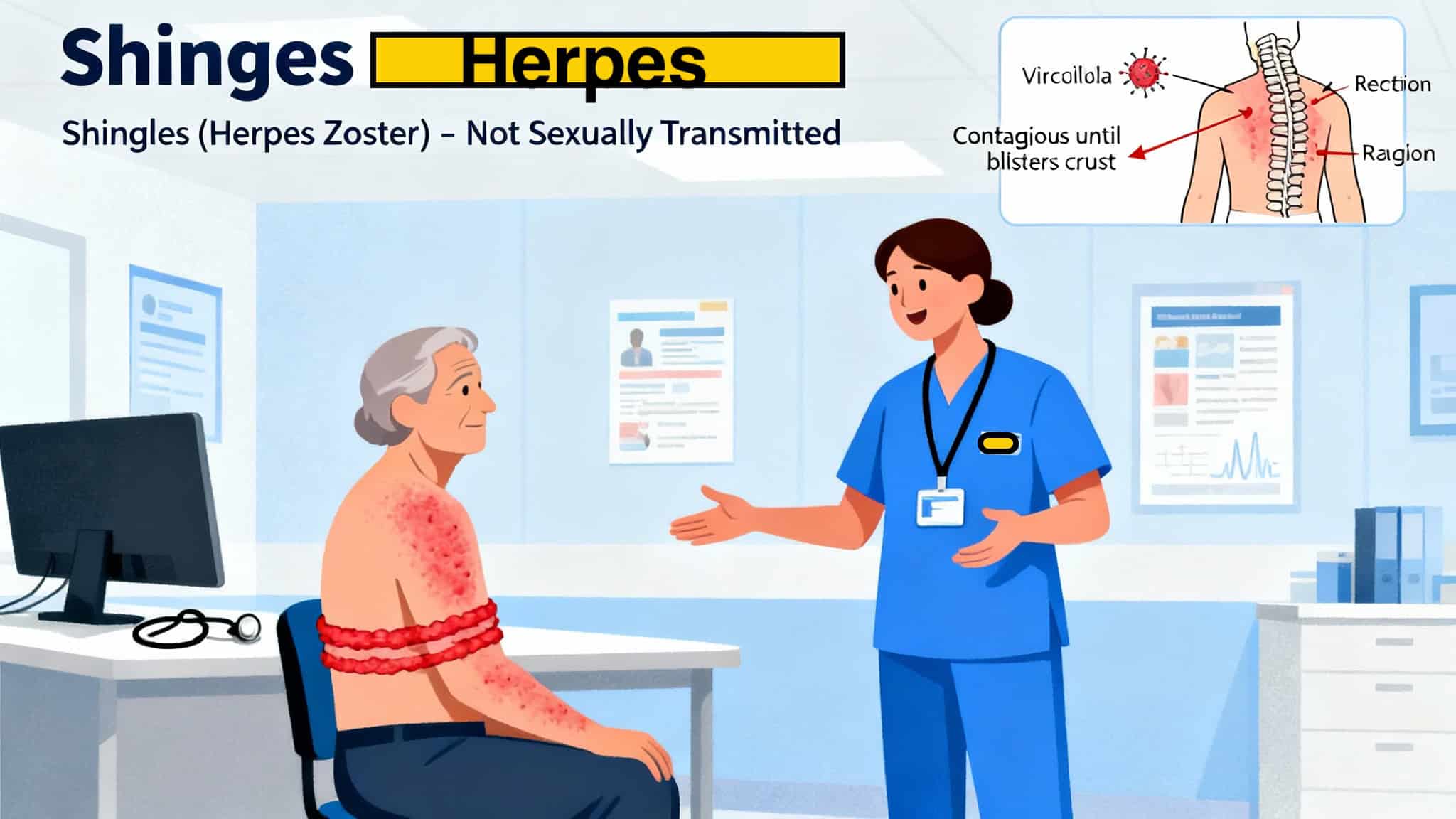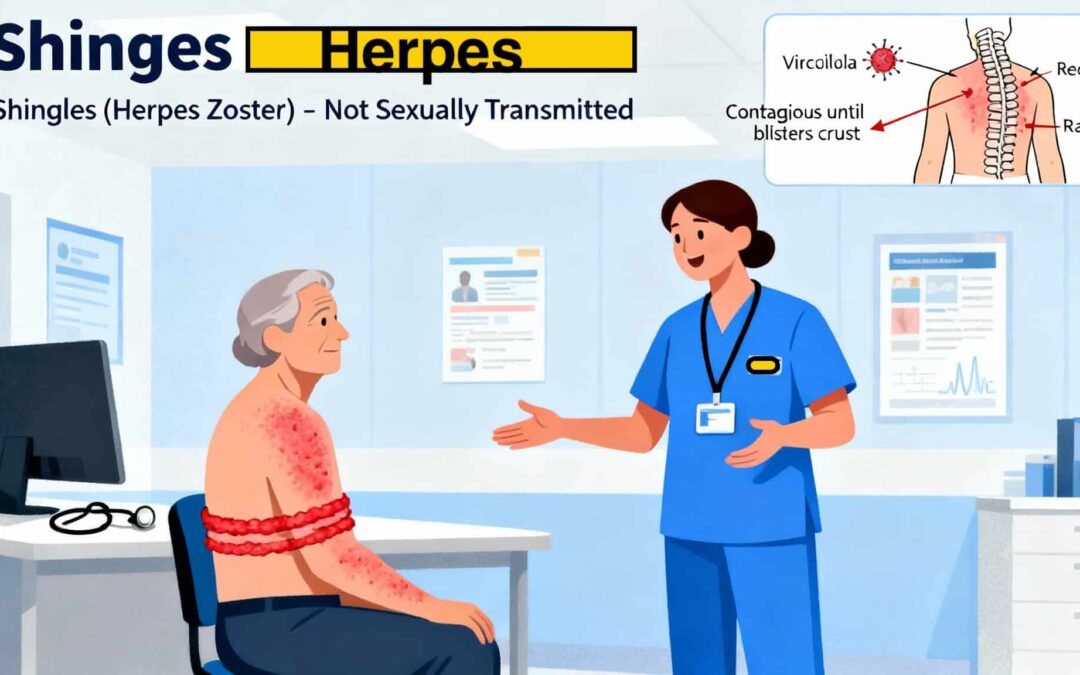Is Herpes Sexually Transmitted? Understanding Herpes
Searching “Is herpes sexually transmitted?” Here’s the key: herpes zoster (often just called “herpes” in this context) is not sexually transmitted. Herpes zoster is a reactivation of the chickenpox virus and is different from herpes simplex, which causes genital herpes and cold sores.

Is Herpes Sexually Transmitted?
Key takeaways
- Shingles (herpes zoster) is not an STI and cannot be passed on through sex.
- It’s caused by reactivation of the chickenpox virus (varicella-zoster) later in life.
- You can transmit chickenpox (not shingles) to someone who hasn’t had it if they touch your open blisters.
- Early antiviral treatment works best within the first 72 hours of rash onset—see a GP promptly.
What is herpes?
Herpes zoster is a painful, blistering rash caused by reactivation of the varicella‑zoster virus—the same virus that causes chickenpox. After chickenpox, the virus lies dormant in nerve cells and can reactivate years later. Although it belongs to the herpes virus family, herpes zoster is not the same as herpes simplex (which causes genital herpes and cold sores) and is not sexually transmitted.
Who gets herpes?
Anyone can develop herpes zoster, but risk is higher:
- Over age 50
- During periods of significant stress
- With weakened immunity (e.g., HIV infection, leukaemia, lymphoma)
- When taking immunosuppressive medicines (including some cancer treatments and steroids)
Younger adults can also develop herpes zoster if their immune system is lowered.
Common herpes symptoms
Early (prodromal) symptoms may occur days before the rash:
- Tingling, numbness, burning, or pain in a band-like area
- Itching and sensitivity to touch
- Constant aching
- Fever, headache, nausea, or upset stomach
Then a rash typically appears on one side of the body (often the torso, sometimes the face):
- Red patches that form clusters of fluid‑filled blisters
- Blisters dry and crust over in about 7–10 days
- Scabs usually fall off within 2–3 weeks
A clinician can usually diagnose herpes zoster once the rash appears; a swab may occasionally be done to confirm.
Is Herpes Sexually Transmitted in this case?
No. Herpes zoster cannot be caught from another person and is not transmitted through sexual contact. However:
- The fluid in open blisters contains live virus.
- If someone who has never had chickenpox (or the vaccine) touches open blisters, they can catch chickenpox—not herpes zoster.
- Risk falls significantly once blisters have dried and crusted.
Practical advice:
- Avoid direct skin contact with open blisters.
- Keep the rash covered where possible.
- If your partner has a herpes zoster rash and you’ve never had chickenpox (or aren’t sure), avoid contact with the blisters until they crust.
How is herpes treated?
Early care reduces pain, duration, and complications:
- Antivirals (e.g., aciclovir, valaciclovir, famciclovir) are most effective within 72 hours of rash onset.
- Pain relief: paracetamol; your GP may prescribe additional pain control if needed.
- Self-care:
- Cool compresses
- Keep the area clean and dry
- Avoid topical antibiotic creams unless your clinician advises
Seek urgent advice if the rash involves your eye/face, pain is severe, you’re immunocompromised, or you’re pregnant.
Who should you avoid contact with while contagious?
Until blisters crust, avoid close contact—especially skin-to-skin—with:
- Pregnant women who have not had chickenpox
- People with weakened immune systems
- Newborn babies (under 1 month), unless it’s your own baby and you’ve been advised otherwise
If you work closely with at‑risk groups (e.g., healthcare, childcare), speak to your employer or GP. Staying off work or school is sensible until the rash is crusted if close contact is likely.
Prevention: herpes (herpes zoster) vaccination in the UK
A vaccine against herpes zoster is available in the UK for eligible age and clinical risk groups. Vaccination reduces your risk and can lessen severity if herpes zoster occurs. Check eligibility with your GP or a qualified clinician.
When to see a doctor
- You suspect herpes (herpes zoster)—especially within 72 hours of the rash starting
- The rash is on your face or near your eye
- You take medicines or have conditions that weaken immunity
- Pain is severe or not controlled with simple painkillers
- You’re pregnant and think you’ve been exposed
MyDoctors can help you understand your symptoms and guide you to appropriate care.
Read More:
Is herpes sexually transmitted when it’s herpes zoster?
No. Herpes zoster is not sexually transmitted.
Can I catch herpes (herpes zoster) from my partner?
You can’t catch herpes zoster from another person. If you’ve never had chickenpox (or the vaccine), contact with open blisters could give you chickenpox.
What triggers herpes (herpes zoster)?
Reactivation of the varicella‑zoster virus, often when immunity is lower due to age, stress, illness, or certain medicines.
How long is herpes (herpes zoster) contagious?
From when blisters appear until they crust over (usually about a week).
When should antiviral treatment start?
Ideally within 72 hours of rash onset.
Should I work with herpes (herpes zoster)?
If close contact with at‑risk people is likely and blisters are not covered, stay off until crusted. Otherwise, cover the rash and discuss with your employer.

